|

|
-
The RootsWorld Radio #295 features tracks from some of our selections for our monthly music series.
The show will stream on our stations and is now available on demand.
Artists for Music of the Month, 2019 were:
Audio courtesy of our partners at RadioFolk.dk
|
|
|
-
While the British Protestant tradition sees hymns come as complete entities, with specially-composed words and music, in the Nordic countries they do things a little differently. There's a long history of mixing the hymn words with folk tunes. It makes sense: the tunes were simple and memorable, people already knew them, and they'd be likely to take up the new words (the oldest text dates from 1572, just to give you an idea). It's this history mingling folk and church that Phřnix jump into on this new album and they do it with glee on their new release, Hvad Intet Řre Hřrte End. Hear the music and read Chris Nickson's review.
|
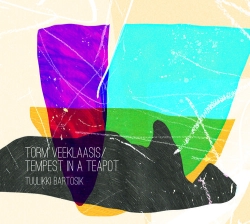
|
-
Tempest In A Teapot, the second solo album by Estonian accordionist, kannel player and singer Tuulikki Bartosik stands in complete contrast to her first. The experimentalism that characterized that debut is replaced with track after track of delicious melody, and it really works. It makes the disc feel personal, and it certainly is. It's about her people, her country, and above all, the area where she lives – Rouge, in the south of the country. But in many ways, this seems like Bartosik's own travelogue: meeting a relative here, observing nature there, a word about a famous musician who lived over there, or telling the epic tale of people who fled Stalin and World War II, first to Sweden and then in a small boat that took them to Portugal and the US... The music throughout – everything is played and composed by Bartosik – might give a nod to minimalism, but its heart is in the soil of Rouge.
Read Chris Nickson's full review and listen.
|
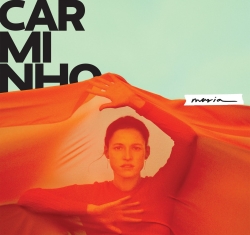
|
-
Fado is not just from a time long ago, but it is a genre that, at its best, stops time. While this Portuguese music is steeped in melancholy like the blues and features big, dramatic singing like opera, it is about powerfully and poetically expressing deep feelings in a way that creates a timeless moment of connection between a singer and listener akin to the "duende" in flamenco. Carminho has been one of the most successful of a new generation of fado singers in Portugal and now arrives in the United States with her debut on the iconoclastic Nonesuch label. Though new listeners will be catching Carminho after her career has already gotten underway, her new album Maria is a return to roots – her own and of the genre.
Marty Lipp explores the singer's history and reviews her new album.
|
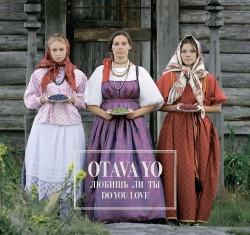
|
-
In 1999 Alexey Belkin formed Reelroad, a band playing a rough energetic Russian take on mostly Irish music, at home in St Petersburg and also touring in the USA and elsewhere. They began to apply the same rumbustious approach to Russian village folk music, and Otava Yo emerged in 2003, first as a quartet of Reelroad members, then adding a second fiddler and bass guitarist. They made entertaining videos in a village setting, and played in their trademark earflap hats and white vest, but I confess I was dubious; they seemed to be grabbing the music and visuals of the village and bashing out the music without going deep... But I saw them live again this year, at Musafir festival in Ufa, Bashkortostan. The set still had great energy and the hats, but with much more musical subtlety, and the reception was jubilantly, dancingly enthusiastic... Do You Love is a good representation of that, reflected in the increased adeptness of arrangements and playing. The vocals are generally group, with instrumentation that's a mixture from Russia and elsewhere...
Read Andrew Cronshaw's review and listen to their music.
|

|
-
Despite success fronting Jaffa Road, a Toronto-based band that mixed the ancient with the modern and the sacred with the secular, Aviva Chernick was looking for a musical outlet that embraced more of her Ashkenazi Jewish roots. She found the gateway to it under the tutorage of Flory Jagoda, a specialist not only in the Sephardic music with origins in Spain, but the Balkan Ladino tradition that branched from it. Three of La Serena's 10 tracks are Jagoda originals, and the rest are rich with her influence...
Tom Orr reviews.
|
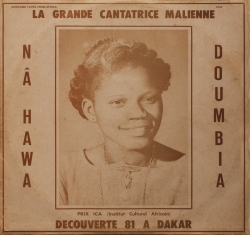
|
-
Bamako in particular and the Wassoulou region in general have produced many of the massive, landlocked nation's most well-known names. From Oumou Sangare to Ali Farka Toure, there's been no shortage of international exports that have not only put the country on the map for many, but have also kicked out some of the continent's deepest grooves... Na Hawa Doumbia's first album, La Grande Cantatrice Malienne, holds a place within a larger circle of hard-driving singers, all of whom started out recording with guitarists and/or n'goni players. Doumbia and her six-string accompanist, N'Gou Bagayoko, also share their tendency to play in what Westerner's would call a minor-key, lending the music a sense of foreboding that the lyrics might just belie... Whatever the case, this album demands repeated listens and one's full attention as Doumbia, barely 20 years old and still developing into the synth-driven dance singer she would become, soars over the guitar, holding tightly to notes before dropping them into the songs' rhythms, apparently determining tempo and tension as a result.
Bruce Miller reviews and you can hear a couple of tracks.
|
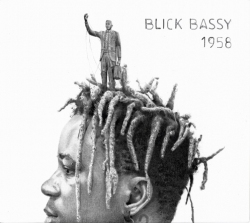
|
-
The absorbing, creative style of Blick Bassy surrounds every aspect of his latest release. 1958 is a concept album that celebrates the bravery of Ruben Um Nyobé, an inspirational hero who dedicated his life to fighting for Cameroon's independence. He was tragically killed by French forces in 1958. Bassy sets out to remind Cameroonians about the importance of Nyobé and urges them to remember their history. He uses minimal blues inspired compositions to provide a foundation for his vocals, often soft and smooth, but at times expansive and pushed to the limit. He writes lyrics mostly in the Bassa language and uses a percussive pulse to deliver his songs with popping guitar and cello patterns. Horns and electronics round out the instruments to make a set of contemporary tracks that do not rely on drums for rhythm.
Alex Brown shares his thoughts, along with a few videos.
|

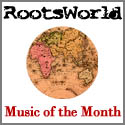
|
-
English folk music rolls on with remarkable depth on Nick Wyke and Becki Driscoll's fifth full-length album, Cold Light. The duo's first album from 2006 featured a mix of traditional and contemporary (self-penned) tunes which highlighted Wyke and Driscoll's complex fiddle playing – sensitively supporting each other's flights, driving each other on, and drawing out compositions that bore witness to two artists on the rise. Over the years, Wyke and Driscoll's sound palette has expanded as other instrumentation and guests have been added to their recordings, but the core has always been the interplay between the duo. Cold Light finds the perfect balance between arrangements and the trad-modern mix that Wyke and Driscoll are mining... Wyke and Driscoll have produced an album of folk music that mixes wondrous chamber-pop deeply founded on a respect for traditional music and modern songcraft. It stands as one of the strongest releases of the year. Lee Blackstone reviews the album, and you can listen to some of the music.
Cold Light is our December choice for Music of the Month. Subscribe, or get this CD, and support RootsWorld.
|

|
-
"Zan Bezan" (Women, Sing) is Liraz's call to join her personal revolution, a revolution expressed in song and dance, encouraging women to work for positive change and female freedom in the Middle East and around the globe. Liraz Charhi is a singer, songwriter, actress and cultural activist with deep personal ties to Persian traditions. Her family (Persian Jews) emigrated to Israel during the 70's, just as the Iranian Revolution was taking shape. It was in the Persian community of Tehrangeles, Los Angeles that she discovered not only new sounds, but a new way of expressing her music in modern terms and contemporary politics, especially about the role of woman in society, as you can hear in this song and video..
|

|
-
Songs From Lands Of Silence is the debut release from Nelia Safaie, an Iranian singer/songwriter and player of tar, setar, and baghlama, offers delicious smaller servings of beauty to bring some light into the most ordinary of days. Largely self-taught as in instrumentalist, in her 30s she moved to Tehran for the musical opportunities it could bring her. She's student with a number of teachers, including vocal lessons from Masha Vahdat. From the very beginning Safaie shows what she can do: "Shoopeh" is full of delicate tracery in the vocals, while baghlama shadows and fills out her singing. It's an introduction and indication of her talents.
Read Chris Nickson's full review and listen to some of the music.
|
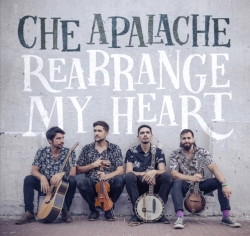
|
-
Near as I can tell, there's nothing odd about a bluegrass band led by a fiddler from North Carolina. But what about a bluegrass band that was formed in Argentina and includes two players from that country as well as a fourth from Mexico? It's bluegrass, yes, and more. The first thing you'll hear when you spin Che Apalache's Rearrange My Heart is a clapped-out clave pattern and a sung invitation, partially in Spanish, to pull up a chair and lend you ears. Doing so reaps many a reward and more than a few surprises. Soon "Maria" kicks in with a dual Americana/Latin sweep that also takes a turn into manouche sounds. It's followed by "The Dreamer," a timely tale about the plight of a DACA recipient who befriended Che Apalache fiddler and front man Joe Troop.
Read Tom Orr's full review and listen to some of the songs.
|
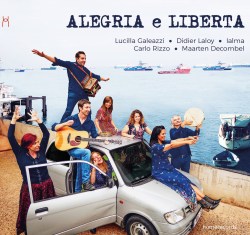
|
-
Lucilla Galeazzi, Didier Laloy, Ialma, Carlo Rizzo and Maarten Decombel join forces on Alegrěa e Libertŕ.
This very enjoyable twelve-track release features the skilled work of eight performers, highlighted by the vocals of Salentina singer Lucilla Galeazzi, and Ialma, the vocal and percussion group from Galicia (Veronica Codesal, Natalia Codesal, Eva Fernandez and Marisol Palomo). At the same time, this disc is the coming together of the talents of accordionist Didier Laloy, tamburello player Carlo Rizzo, and Maarten Decombel on the guitar, and the lyrics of Brais Fernandes and Galeazzi. In a time when freedoms are being threatened, including artistic freedoms, in Europe and elsewhere, my sense is that this is a quiet cri-de-coeur from artists that are part of that international community that is forming in places like Belgium, where many paths cross in the heart of today's political Europe...
Read David Cox' full review and listen to the music.
|
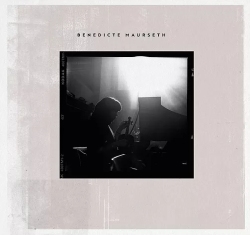
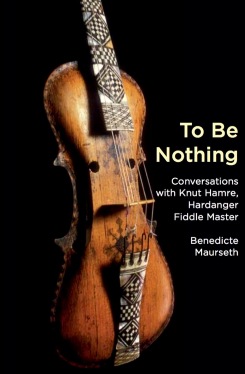
|
-
Benedicte Maurseth is one of the Norway's leading players of the Hardanger fiddle (she comes from the region where it originated; you might say it's in her DNA). The instrument is similar to a violin, but with four or five tuned sympathetic strings that resonate and deliciously eerie depth to the music. For, this her seventh album, she's completely solo (apart from some birdsong on one cut), taking traditional music, tunes associated with different fiddlers, and adding her own voice and ideas to them in variations and improvisations. It's beautifully meditative and utterly immersive; you don't listen to the disc; it draws you in until you're subsumed in the music. Read Chris Nickson's full review and listen to some of the music.
You can also read Chris' book review of Maurseth's To Be Nothing: Conversations with Knut Hamre, Hardanger Fiddle Master.
|
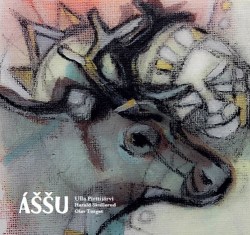
|
-
Sámi music takes many forms, and Ássu's debut release is informed by a lot of influences while remaining true to the north. This collection of eleven tracks, primarily traditional in origin, sounds like a merger of the music of the northern Sámi, the joik, with elements seemingly transplanted from the Sahara. Harald Skullerud, the Norwegian percussionist, and Olav Torget, a strikingly innovative guitarist, team up with Ulla Pirttijärvi, the famed Sami artist, and co-creator of Solju, to create a soundscape which very much rocks the joik, or traditional Sámi song. Fans of Tinariwen and Boubacar Traoré might well recognize some of the stylings of Torget, who along with Skullerud has spent time in Mali and Senegal - and have a history of bringing Norwegian and West African music together. No surprise. If it wasn't for the inimitable vocal style it would be easy to place this disc a couple of thousand kilometers south of its place of origin.
Read David Cox' full review and listen.
|
Music of the Month
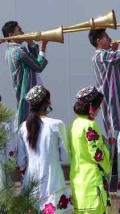
|
-
A bakhshi is a singer of epic ballads that can last, Homeric-like, for many hours or even days, self-accompanying usually on dutar, the thin-necked two-string lute. The Bashkirs have a true living song tradition; singing is a normal part of life, and some epics last several days. Termez is at the southern tip of the country, on the river Amu Darya that forms the border with Afghanistan, with the extremities of Turkmenistan and Tajikistan not far west and east respectively. In fact it's pretty much at a confluence of Central Asia's -stans. Founded over 2,500 years ago, in 1220 the original city was destroyed by Genghis Khan. Under Russian rule from the end of the 19th century, Termez became a military base until the end of the Soviet-Afghan war, and Uzbekistan's independence in 1991, and today it's a fast-modernizing, spread-out city.
Andrew Cronshaw takes you to a festival and competition centered on these great singers, in photos, words and an interesting audio piece.
|
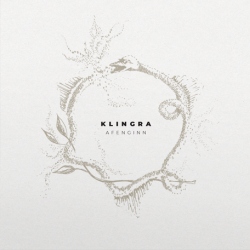
|
-
It's been interesting to hear the way Afenginn have grown over the course of the seven albums since their 2004 debut. With each outing, the reach of leader/composer Kim Rafael Nyberg has grown by leaps and bounds, but with Klingra he's gone far beyond anything he's attempted before, capturing the great sweep that extends beyond the Denmark/Sweden/Finland axis and far out into the North Atlantic to the Faroe Isles. But it's not solely the composition, which has long been edging towards something like this; the band itself has morphed, too. Four of the musicians from the last album are here (including Nyberg, who plays nothing this time around; he's become purely the composer and arranger), along with the Danish String Quartet and several Faroese musicians. Afenginn has always had a pan-Nordic vision, but this time it's taken on a different identity.
Chris Nickson takes you into this unique aural landscape.
|

|
-
Influenced by the music of his native Algeria and his adopted homeland of France, the late Rachid Taha always put the wry in rai.
While Je Suis Africain feels like it should somehow be a weighty epitaph for his unique career (he died of a heart attack last year), the album fits the situation only in that it maintains his signature cultural mix and continues the themes of his career as a smart aleck that rocked out as he thumbed his nose at the assholes that made life tough for immigrants. Born in Oran, Taha emigrated to Lyons, where he worked in a factory and eventually started gigging as a deejay at a local club, playing a mix of Western rock and Middle Eastern sounds that were coming up, such as rai and chaabi. That bringing together and celebrating various kinds of music continued right up through this last album, which touches on an array of styles... Read Marty Lipp's review and hear some of the music.
|
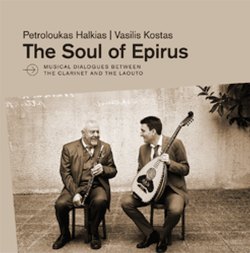

|
-
The mention of the music of Epirus, a region of south-eastern Europe now divided between north-east Greece and southern Albania, evokes the sound of a sobbing, down-bending clarinet, on the slow tunes like Escher's ever-descending staircase. But it's not necessarily sad music, and much on The Soul of Epirus by the 85-year-old clarinet master Petroloukas Halkias and Vasilis Kostas, 29-year-old master of the laouto (lute with eight steel strings), is joyful and skittering... This is beautiful, exciting, heart-felt music by two brilliant players...
Read Andrew Cronshaw's review and listen to some of the music.
The Soul Of Epirus is our November selection for Music of the Month
Subscribe monthly, or get only this CD and support RootsWorld.
|
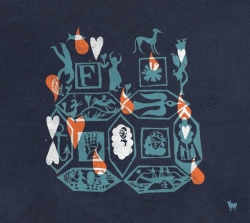
|
-
The Furrow Collective's Fathoms is the group's third full-length album, and as on previous releases, the band's plumbs traditional music in an unsparing, contemporary manner. Comprised of four sterling musicians – Lucy Farrell (voice, viola, tenor guitar, percussion), Rachel Newton (voice, electroharp, fiddle, piano, percussion), Emily Portman (voice, banjo, concertina, harmonium, percussion), and Alasdair Roberts (voice, acoustic and electric guitars, banjolin, piano, harmonium) – The Furrow Collective brings its members' English and Scottish roots to the table.
Lee Blackstone digs deep into the music of this superb quartet.
|
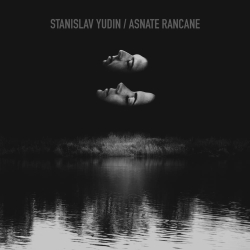
|
-
A double bassist and a singer - both of them doubling on other instruments - explore the very fluid boundary between folk music and improvisation, and create something that lingers long in the mind. The words come from traditional songs, some from the musicians' native Latvia, but also Lithuania, Bulgaria and the Ukraine - notably, all countries once repressed under the Soviet yoke. Stansilav Yudin And Asnata Rancāne give a grounding to the songs, an anchor, although at times they seem to hover, circling around and over a track, more ghostlike than solid. The words are the clothes, however; it's the music that's the body of Op. 2.
Read Chris Nickson's review and hear the some of the music
|
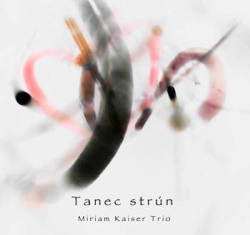
|
-
Tanec Strún is a reverential reimagining of Slovak folk traditions fed into modern Western styles, mostly ballads, interpreted by the Miriam Kaiser Trio. Strings predominate - violin, viola, cello - with added percussion, jew's harp and synthesizer. The trio is Miriam Kaiser, violinist, arranger, vocalist; Milan Adamec, producer, arranger, violinist, electronics; and Júlia Vesselá, cello, with lyrics by Kaiser and Nad'a Mitanová.
The Slovak song tradition goes back to the 18th century and is said to be among the richest of Central Europe. Western music, newly embraced after being forbidden in the Soviet Union until its fall in 1989, is the axis around which these songs turn. Infused electronic strains contribute definitively these works, luxuriously padding the songs rather than usurping them.
Hear some songs and excerpts from the album, and read Carolina Amoruso's review.
|
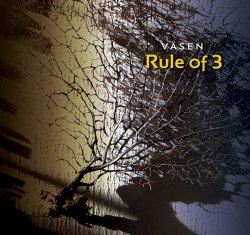
|
-
It's remarkable to consider that the Swedish trio Väsen have been around for 30 years now, releasing album after album of satisfying music, often with a sly touch of gentle humor. They helped to create the movement of European instrumental music, grounded in native folk tradition, but with ambitions and reach far beyond it. With nyckelharpa/viola/guitar and three virtuoso players, they have stayed at the forefront. Rule of 3 isn't a musical revolution of any kind. It's simply a journey further down the road that Väsen began to walk three decades ago.
Read Chris Nickson's review and hear the music.
|

|
-
Daniel Cros, a singer-songwriter based in Barcelona, presents a likeable 10-tune collection of songs about travelling, evoking voyages to Latin America, France and elsewhere. He began his solo career in 1995. He also founded the Rosazul recording studio in Barcelona. Sed de Viaje does not break a lot of new ground musically, but successfully presents a very likeable selection with his warm, calm voice and compelling acoustic guitar.
Read David Cox review and listen to some songs.
|

|
-
Madagascar, due to its having broken off of the Indian subcontinent some 88 million years, is well known for plants and animals not found anywhere else. The same might be said of its music, traditionally played on zither-like instruments, preserved from Indonesian origin, such as the marovany and valiha. Malagasy folk have simply managed to apply their own melodic and rhythmic concepts to anything they touch, be it the accordion, the guitar, or choral vocal music... Not surprisingly, the electric guitar changed much once it was introduced on the island in the late 1950s. Pop bands, mixing indigenous grooves with sounds coming from South African radio soon followed, and this concoction serves as something of a foundation for the sometimes loping other times stuttering tracks that have been so smartly curated on Alefa Madagascar! Salegy, Soukous, and Soul From the Red Island 1974-1984.
Read Bruce Miller's review and hear some tracks from the set.
|
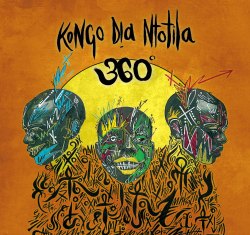
|
-
The driving sound of London's creative music scene cuts right through 360°, the second release from Kongo Dia Ntotila. Led by Mulele Matondo, who is originally from the Democratic Republic of Congo, this ensemble blends Central African dance music together with jazz and other styles to create an energetic mix they refer to as "Kongo Jazz." This uptempo music is shaped by intricate polyrhythms that feel alive, drawing upon the full technique of the band. Two electric guitars (John Kelly and Diala Sakuba), bass (Mulele Matondo), drums (David Lessie), trumpet (Mike Soper), and sax (Will Scott) lace intricate phrases together with precision while the vocals are split between Matondo and Lessie...
Read Alex Brown's review, hear some songs and see a live performance video.
|
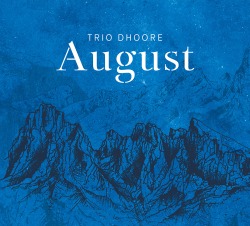
|
-
In their nine years together, the Belgian brothers of Trio Dhoore have come a long way. Starting out as highly talented young lads, they've grown into a central part of the European instrumental movement, influenced but not completely consumed by their native traditions.
August, their fourth album sees them experimenting more than ever before, bringing soundscapes, synths, and electric guitar into their world, alongside hurdy-gurdy and diatonic accordion. It makes for a timeless sound palette that is ancient and refreshingly new at the same time, especially as everything is handled sparingly and with quite exquisite taste.
Read Chris Nickson's review and listen to some of the music.
|
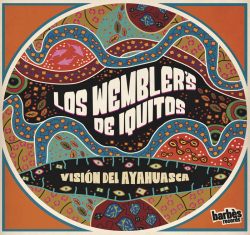
|
-
Chicha, or cumbia peruana, as it was called in its nascence, is uniquely Peruvian and a mainstay of the national repertoire since the late 60s, early 70s. (Chicha is named after an ancient Amerindian fermented or virgin brew made from purple corn.) It's an idiosyncratic amalgam of musics, with jumpbacks to of all things the surf guitars of such as Dick Dale, e, the Ventures, Surfaris, and more; you'll also hear strains of Peru's romantic and old-timey criollo music, Amazonia, Afro-Latin, classic and psychedelic rock, and inevitably its backbone of cumbia from Peru, Colombia and, more recently, cumbia electronica. Los Wembler's de Iquitos go back to the first crop of chicha bands, led by Los Destellos, a bunch from Rimac, a working class area of Lima, that formed in 1966... The step firmly back onto the international circuit in 2012 and are celebrating their 50th anniversary with Visión del Ayahuasca. (Ayahuasca is another ancient brew of tradition, this one hallucinogenic and used sacramentally in indigenous ceremonies, though it has penetrated mainstream Peru and far beyond.) The CD includes a number of new songs and revisits some of the old. Production is up and all of the tunes sport vocals; even when not pitch perfect, they add to the listenability diminished by the repetitious melody of some of the older works...
Read Carolina Amoruso's review and listen to some of the songs
|
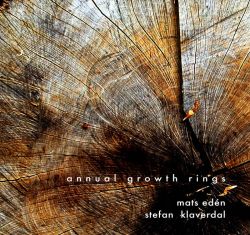
|
-
So much of what falls under the category of "world music" is often focused on one or two cultures, and in its wanderlust reveals something beyond human nature's tendency to draw borders around itself. Throughout annual growth rings, the fertile collaboration between Mats Edén (playing violin and viola d'amore) and sound artist Stefan Klaverdal, we search not far and wide for metaphysical connections, but rather dive inward to articulate commonalities between all matterliving and nonlivingat the molecular level. Although the sounds come mostly from Edén's strings, processed live by Klaverdal, the resulting assemblage is as organic in feel as each track title is in image. Tyran Grillo reviews, and the artists share some of their music.
|
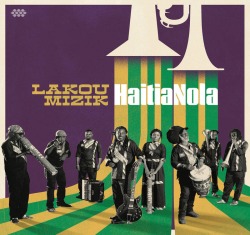

|
-
Haitian roots outfit Lakou Mizik is the brainchild of singer Jonas Attis and guitarist/singer Steeve Valcourt. Lakou Mizik brings together a multi-generational septet of some of Haiti's best musicians to showcase the diversity of modern Haitian sounds, including konpas, kanaval songs, twobadou ballads, and vodou ritual music. Now Lakou Mizik returns with a barn-burner of a second act on HaitiNola. The album revisits the connections between Haiti and New Orleans with a crew of NOLA musical all-stars including The Preservation Hall Jazz Band, Leyla McCalla, Cyril Neville, Trombone Shorty, Win Butler, Régine Chassagne, Lost Bayou Ramblers, The Soul Rebels, 79ers Gang and many others. Read Tom Pryor's review and listen to some of the music
HaitiaNola is our Music of the Month selection for October, 2019. Your 20.00 a month (US; 28.00 globally) subscription will get you brilliant music from around the world every month and help support RootsWorld's continuing mission. These CDs are donated by the artists and labels, so all of your contribution goes to support the magazine. Subscribe now.
|
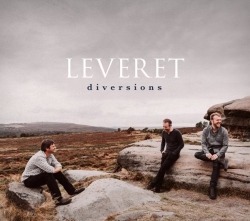
|
-
Leveret started life a few short years ago carrying the reputation of an English folk supergroup. It's easy to understand why they deserve the tag. No songs, all tunes played on melodeon/button accordion, English concertina, and fiddle. But Diversions towers over most everything being released. That's all the more impressive for being recorded live over the course of just a few days with virtually no rehearsal. The empathy between the three musicians shows just how much they listen and desire to complement each other and the tune by never overplaying. There's great delicacy in the arrangements – simply let the sorrowful beauty of "The Wounded Huzzar" (from poet John Clare) or the grandeur of "Unanimity/King George The Third's March" flow over you for examples of the way the instruments weave in and out and around each other...
Read Chris Nickson's review and listen.
|

|
-
For the first fleeting seconds, Ethiopiques—Revolt of the Soul entices us with a bar or two of intriguing piano tones that seem both western and eastern, familiar and new. Immediately and incongruously thereafter, we're on a train bulleting through what we're sure is a European town. Cut now to a marvelous painted image of a black-tied orchestra fronted by a vocalist and 2 back-up singers having a swell time of it. And, yes, we realize that the music is Ethiopian, sophisticated, mysterious, pentatonic, and penetrating.
The lush sound lingers in the background as we return to small-town Europe, Poitiers, France, invited by an intent and reflective silver-haired gentleman to his studio replete with books, a reel-to-reel recorder, 33 RPM records and much more. Journalist Francis Falceto begins, "All, every one, is to do with Ethiopia." Falceto is enamored of Ethiopian music. So there's the link and now our story can unfold. The film illustrates Falceto's mission to catalog, remix, and release on disc a trove of remarkable music played by remarkable musicians, the best of the golden age of Ethiopian jazz-funk-R and B, running generally from the late nineteen sixties until the mid-seventies when a newly installed military dictatorship, the Derg, wrecked havoc and terror upon the country and its cultural riches.
Carolina Amoruso reviews a remarkable film.
|
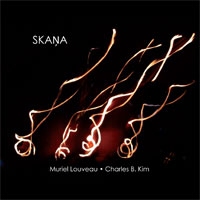
|
-
On Skana, French singer and composer Muriel Louveau collaborates with American composer and producer Charles B. Kim to yield a world of classical and cinematic associations. Texts drawn from the Latin mass, as well as the poetry of William Blake and John of the Cross, speak to an imaginary congregation that transcends time and space. In outer terms, the music is a veiled mix of vocal overdubs, synthesizers, and percussion. In inner terms, it speaks in a language far grander than those mere elements would imply.
Tyran Grillo looks back on this 2009 release that he says is filled with "purity of expression and fullness of meaning."
|
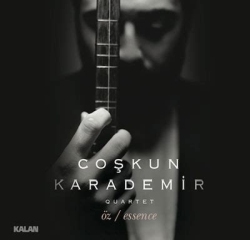
|
-
Following his unmissable collaboration with Mahsa Vahdat, Endless Path, Turkish baglama virtuoso Coskun Karademir resurfaces as if from deep meditation with a newly fashioned quartet. Joined by Cem Ekmen (duduk), Ugurcan Sesler (cello), and Ömer Arslan (percussion), he journeys through a landscape of traditional music modernly reimagined, modern music anciently reimagined, and original pieces on Öz/Essence. Much of the program is by composer Levent Güne and Karademir himself. That both have written for films is immediately obvious, as one can visualize entire story lines, characters, and dramas within each tune.
Tyran Grillo reviews.
|
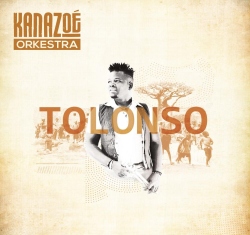
|
-
Balafon master Seydou "Kanazoé" Diabaté follows in the footsteps of his ancestors and takes his contemporary African music to audiences around the world. His rich compositions and arrangements are given life by his talented Kanazoé Orkestra . On Tolonso, he is reunited with Mamadou Dembélé (flute, ngoni, balafon, vocals), Martin Etienne (saxophone), Stéphane Perruchet (percussion), Elvin Bironien (bass), and Laurent Planells (drums). This time around, Losso Keďta joins the band and adds his powerful vocals to the mix... Tolonso means "where we celebrate" and it also is the name of Diabaté's birthplace in Burkina Faso. There is plenty to revere on this album. Sambla, Mandingo and Bambara traditions combine with jazz, Latin and even some electronic elements to create a lively set of African music
Read Alex Brown's review and hear some of the music.
|
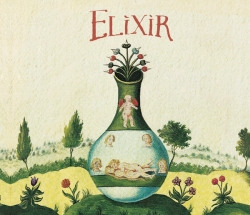

|
-
Although the word elixir is often associated with medicinal quackery and alchemy, its etymology resides in the Greek xerion, meaning "powder for drying wounds." That same combination of aridity and healing is felt in the restoratives mixed by Aurélie Dorzée, Tom Theuns, and special guest Michel Massot. In their admixture of instruments both commonly (guitar, trombone, banjo, sitar) and not so commonly (nail violin, mandolauoto, alto saxhorn, sousaphone) heard, Elixir brings truth of evocation to everything they touch. Compositional credit is shared by Dorzée and Theuns as catalysts of every chemical reaction herein, starting with the "Ouverture." As its record warps into correct speed, it serves as portal both to and from some forgotten past, setting the stage for a fantastic journey. Much of what ensues is shaded by artfully chosen colors. Between the overlay of Dorzée's fluid, folk-inspired violin and singing to the underlay of Theuns's sitar and mandolin, there's more than enough to elicit fresh experiences and discoveries with each listen. All of it is held together by Massot's sousaphone, which draws a thick and surprisingly melodic thread through the center. And while it does resort to the occasional harrumph, it's a deeply serious player of deeply serious music...
Read Tyran Grillo's full review.
Elixir is our Music of the Month selection for September.
You can subscribe for 20.00 a month (28.00 outside of North America) and get new music every month, while helping to support RootsWorld. Or you can receive the individual CD for a one time donation. These CDs are donated by the artists and Homerecords.be. We thank them for all of their support.
|
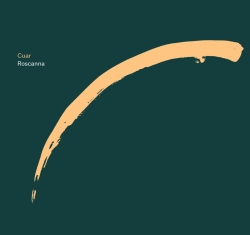
|
-
Cuar is a trio consisting of Matthew Berrill on clarinet, Aoife Ní Bhriain on fiddle, and Neil Ó Loclainn on double bass and flute. But the music they create is more than a triangulation; it's a pyramid whose structural integrity depends on the listener as its base. All the music on Roscanna, with the exception of the final track, is rooted in the mind of Ó Loclainn. The album's conclusion, the traditional Irish "Bádaí na Scadán," is an emerald clue into its origins, as well as proof of the trio's willingness to dig deep enough so that geography ceases to matter.
Read Tyran Grillo's review and hear a few tracks from the album.
|

|
-
The South Africa-derived rhythms of Malawi's regional folk/pop hybrids, often produced on homemade instruments out of economic necessity, have garnered a bit of attention of late... The duo that comprises Madalitso Band spent years playing the streets of the nation's capital, Lilongwe, which, despite being the governmental hub, contains massive poverty and unemployment... Homemade instruments such as the ones played on this record, seem like orchestras. The guitar, played by Yosefe Kalekeni, holds tight to the rhythm while Yobu Maligwa's long-necked, banjo-like babatoni, the sliding bass sound prominent in many of the country's regional bands, serves as bottom end as well as lead. While key shifts are few, dynamics, subtleties, and variety seem endless. And their vocal harmonies are like choruses.
Bruce Miller reviews.
|

|
-
It has been more than 20 years since Latvia freed itself from Russia and Communism; there's a generation that's grown up in the heady air, and the six women of Tautumeitas are among them. They're part of the second Latvian folk revival – the first was part of the 1970s cultural resistance against the Russians – and their debut is full of joy, eagerly grabbing the country's tradition and pulling it into the 21st century... They bring big arrangements and choruses to the tradition, but keep the multi-part polyphonic singing that's at the heart of Latvian music (historically performed by women). Instrumentally, on top of their own violins and accordion, there's jaw harp, bass, and some electronic programming that gives plenty of punch to the sound.
Here is Chris Nickson's review and some songs to listen to
|
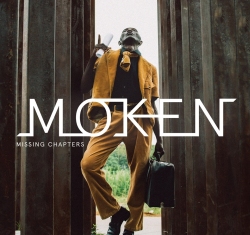
|
-
Chances are good that there's nothing else even remotely like this record being released this year. Take your most slicked-up "world" muzak blandness- you know, the stuff with quasi-Cuban rhythms, lobotomized acoustic guitar strumming and production meant to render passion into processed bites of disposability- and then allow the musicians on the recording to fidget, squirm, and finally break from their constrictions, and you've got this record. Its sounds may seem disguised as Starbucks background, but there's something warped lurking just below the surface... Moken, who hails from Cameroun but spent time in Detroit before calling Atlanta home sings, steers the guitar licks, the trumpet, some of the percussion and the occasional ngoni, all to this record's benefit. Listening to him can often feel unsettling, perhaps even demanding sea legs. On the surface, it's all pretty normal until you pay him a little more attention...
http://www.rootsworld.com/reviews/moken-19.shtml
Read Bruce Miller's review of Missing Chapters and see a few videos by this most unusual artist.
|
|
|
-
In small, neglected Colombian villages not too far from the Caribbean coast, descendants of runaway slaves and freed people have managed to hang onto musical traditions connected not only to Afro-Cuba, but Africa itself. Theirs is the story of neglect, isolation, marginalization, and poverty that often accompanies preserved traditions in so much of the world. Access to education and health care are few; illiteracy looms large, and at least one the performers here has no birth information. However, what Voces Del Bullerengue do have is a rich tradition of bullerengue, a vocal-based music driven by cantadoras, elderly women who engage in call and response over complex hand drum patterns and clapping... And from what's on offer on Anonimas & Resilientes, bullerengue feels vibrant and healthy despite singers who are no younger than 53, with one woman possibly as old as 105.
Bruce Miller looks into this fascinating music.
|
|
-
Songs of Our Native Daughters is the result of four singular artists coming together to, in a sense, create music that re-creates musical history. Rhiannon Giddens, Amythyst Kiah, Leyla McCalla, and Allison Russell are all interested in black string music, which lost its identity as such after the music crossed over to white musicians playing what became commonly thought of as bluegrass or "country music." The opera-trained Giddens has gotten critical acclaim for her own music and is the best known of the four singers, and certainly turns in some gorgeous and stirring vocal performances, but she also shares leads with her compatriots here. The resulting album is both a powerful examination of slavery and a celebration of the resiliency of those subjected to decades of oppression, particularly black women.
Read Marty Lipp's review and listen to some songs from the album.
|
|
-
The Danish string trio Vesselil (violin, viola, cello and voices) has been around since the end of 2015, but this self-titled work shows the wisdom of taking time over a first release. A mix of original compositions with traditional folk from Denmark, Sweden, and Belgium, the pieces show just how well the musicians understand and work with each other, and how they've allow things to simmer and develop. That's perfectly illustrated on the album's longest track, "Opdagede Omsider" written by violin/viola player Clara Tesch. While a piece of its soul might lie in folk music, it has more in common with a modern string quartet, and the instruments create a delicately beautiful, complex web of sound that draws in the listener... They approach the traditional pieces with respect for the past, but refuse to be slaves to it.
Read Chris Nickson's full review and listen to some songs from the album.
|
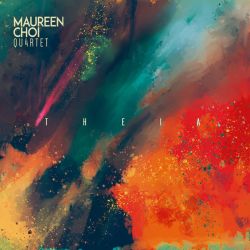
|
-
In 2017, violinist Maureen Choi issued her first album. Theia, named for the Greek goddess of sight and all things shiny, reveals how much she's matured as an instrumentalist, arranger and composer in such a short time. Theia is a fluid pairing of flamenco and straight-ahead jazz, with scattered references to her classical, especially baroque, beginnings. Flamenco, though, with its fire, immediacy, its ability to embrace myriad influences, pushes through as 'Theia's' lifeblood.
Six of the album's ten songs are Choi's own; the others are personalized yet faithful reworkings of a disparate repertoire, including a traditional Venezuelan joropo, and bold interpretations of works by Paco de Lucia and Manuel de Falla.
Read Carolina Amoruso's review and listen to some tracks from the album.
|

|
-
Finland and accordions
Anyone who has been reading RootsWorld for a while knows that your editor is completely in thrall of both, so when they collide, as they often do, they grab my attention. Teija Niku plays a full chromatic accordion, which she told me is, "a Finnish chromatic standard bass accordion, made in Italy at the Pigini factory. In Finland the model is called Lasse Pihlajamaa Revontuli Casotto." She has played in numerous ensemble settings, including with The Polka Chicks, Aallotar and Karuna, as well as performing as a soloist and with her own self-named quartet. Hetkessä is a solo affair, just the accordion and occasional vocals. The title – in the moment - is an excellent description of the work here, as the pieces seem carefully composed, and yet clearly spring from improvisational impulses during the writing process.
Read the editor's review and listen to the music
|
|
|
-
Following on their Kind Of Folk Volume 1: Sweden, Groupa delivers their impressions of Norway. As before, the trio consists of Mats Eden (viola d'amore and hardingfele), Terje Isungset (drums, percussion, and whatever he can get his hands on), and Jonas Simonson (flutes)... Mats Eden hails from Värmland in Sweden, which borders on Norway, and he studied composition at the Norwegian Academy of Music in Oslo. Terje Isungset's percussion embraces both traditional and non-traditional instruments. Isungset is no stranger to molding unconventional natural materials into musical instruments, as evidenced by the series of music that he has produced using instruments fashioned from ice. Simonson's tone and appreciation for both rhythm and atmosphere are the marks of a master flautist... The Groupa trio manage the tightrope between folk melodies and improvisation so that they do not sound like any other musical ensemble, and this is in large part to the distinctive and recognizable playing of each musician exhibited on Kind Of Folk Volume 2: Norway.
Read Lee Blackstone's full review and listen to some excerpts from the album
|
|
-
The sound of a good string section can invoke everything from baroque grandeur to gripping suspense to signaling when to break out the hanky during sad scenes of a movie or TV show. There's no doubt that the San Francisco-born Real Vocal String Quartet can do all that and more without breaking a sweat, but founding violinist Irene Sazer and her mates (fiddler Sumaia Jackson, cellist David Tangney and double bassist Sam Shuhan with cellist Helen Newby as an occasional fifth) have bigger things in mind. An Eastern European tour through the American Music Abroad Program inspired Sazer to collaborate with musicians from some of San Francisco's sister cities - the Culture Kin of the title - and the results are a passionately rendered set of musical pieces that both stir and soothe. Read Tom Orr's review and listen to their music.
Culture Kin is July's Music of the Month selection. Start a monthly subscription or buy the CD and help support RootsWorld.
|
|
|
-
Kamancheh master Kayhan Kalhor has always been a migratory artist—one who treats boundaries as opportunities for expansion rather than trepidation. It's Still Autumn stands as one of his most adventurous projects. In unusual yet intuitive combination with Rembrandt Frerichs (fortepiano, harmonium), Tony Overwater (bass viol, double bass), and Vinsent Planjer (whisper kit), he doesn't so much chart new territory as create it from the Earth's darkest caverns to its brightest skies. Appropriate, then, that It's Still Autumn should be diurnally sequenced into Dawn and Dusk.
Read Tyran Grillo's review and hear a few tracks.
|
|
|
-
AKA Trio is the result of a strong friendship between three talented musicians from different parts of the world. Antonio Forcione (Italy), Seckou Keita (Senegal), and Adriano Adewale (Brazil) all met in the UK and formed a natural bond over hanging out, cooking, and playing soccer together. Each individual has worked extensively with a diverse array of artists, touring the globe and recording a number of cherished releases. Collectively they have created something that sounds natural right away, translating their fun and passion into JOY, an album that reflects their musical union. Forcione (guitar), Keita (kora), and Adewale (percussion) seem to work effortlessly with one another. They have played on and off together for the past eight years, but finally found the opportunity to meet in the studio last September. They read each other well and often sound like more than three musicians, supporting the compositions with tender harmonies. Each song is written independently, besides the title track, but they are all fostered by the group.
Read Alex Brown's review, listen to some of the songs and see 2 videos.
|
|
|
-
Athens-based lyra virtuoso Sokratis Sinopoulos returns to the quartet that earned him deserved acclaim, on their latest work, Metamodal. With pianist Yann Keerim, bassist Dimitris Tsekouras, and drummer Dimitris Emmanouil. He once again brings the ancient and the unexpected into harmony. At the heart of Metamodal is its eponymous suite, divided into three parts: "Liquid," "Illusions," and "Dimensions." From its quiet hole emerges a snake of melodic origin whose tongue flickers always in search of the next note. Behind the insistence of Sinopoulos's playing, clay drums and bass erode a stony topography. As background and foreground intermingle, dances speak not of a celebratory present but of an unrecoverable past.
Read Tyran Grillo's full review and listen to some music
|
|
-
Glasgow, Scotland has long been a hotbed of popular music... Awash in this bounty of great rock and pop music, what can often be ignored is the city's rich and varied history with traditional folk music. Some of Britain's oldest folk clubs like the Star Folk Club, Partick Folk Club, and the Ben Nevis all call Glasgow their home, and have made significant contributions to the city's musical reputation. Glasgow is also the hometown of traditional Gaelic singer and BBC Radio and Television Scotland host Mary Ann Kennedy.
Her new CD is Glaschu - Hometown Love Song. Much like "St Mungo, a Celtic Suite for Glasgow" composed by William Jackson, and "Glasgow" by Findlay Napier, it showcases a traditional musician paying tribute to a hometown which still holds a huge influence on their lives and their music. Glasgow has undergone many transformations in the 20th and 21st centuries, but has remained home to a great many young and experienced musicians comfortable in their surroundings, and a cheaper alternative to Edinburgh's or London's high rents. Glaschu is an album of many moods, from the bouncy opening track, "The Glasgow Shinty," to the spoken word of "Orange Parade in Glasgow."
Read david Smith's review and hear some of the music.
|
|
|
-
When is a jazz band not a jazz band? When it is being a jazz band - stretching the boundaries of the music it is performing as the Town Hall Ensemble did in concert with Senegalese star Baaba Maal. The concept was to revisit songs from Maal's long career and rearrange them for the Town Hall Ensemble and three members of Maal's band. While Maal is firmly rooted in traditional African music, he has always played in contemporary contexts, both with his band Daande Lenol and various partnerships with pop musicians. Prior to the show, Maal said, "I love re-discovering my older songs and often change how I perform them…It's not going to be strictly jazz. It's my music, African music, performed with these jazz musicians."
Read Marty Lipp's review of the concert
|
|
|
-
Maletiempu is a tough album to wrap words around. It is a stripped-down and sometimes gentle affair that has what they refer to as a "Salentine melancholy." Led by voice, accordion, flute and percussion, with some contributing artists on guitars, percussion and additional voice, its unifying strength is in the traditional songs they choose, and how they inform the contemporary works these artists create in this collaboration.
Both artists will be familiar to fans of southern Italian music. Vocalist Rachele Andrioli started with the ensemble Officina Zoč, was part of Canzionere Grecanico Salentino, and has traveled the world singing with musicians from all manner of musical background... Rocco Nigro is an accordionist and composer of songs and film scores. RootsWorld readers know of his work with Vinicio Capossela, Opa Cupa, Cesare Dell'Anna, Antonio Castrignanň, Redi Hasa & Maria Mazzotta and many more.
The album's opening track immediately sets the tone for what is to come, with Andrioli's plaintive first notes in the title track shifting quickly to more mid-tempo percussion and accordion phrases. "Maletiempu" moves back and forth between a fervent paean and a plaintive cry, often with startling stops and changes in mood. She sings about the passage of time, how it comes and goes, waxes and wanes, kisses us and then leaves us in tears. The delivery is often heartbreaking, even as the song offers as much promise as melancholy...
You can read the full review, hear some of the music and watch a video online
Maletiempu is our Music of the Month selection for June. Find out more, and subscribe or get the CD and support RootsWorld.
|
|
|
-
In the late 1960s, British architectural historian and blues aficionado Paul Oliver released a book as well as a 4 LP set titled The Story of the Blues. The record, as it turned out, opened with a field recording of Fra Fra tribes people from Ghana's extreme northeast. And while Oliver's claims that this music was the origin of the blues seems horribly reductive, it allowed westerners to have awareness of the culture's existence, and gave many their first glimpse into American music's sundry tributaries.
More recently, the music of Bongo, Ghana-area Fra Fra kologo player King Ayisoba has received global attention, due in part to the work a local producer Francis Ayagama, but also due to the interest of Arnold de Boer, a musician who is not only a recent addition to the long running Dutch avant-punk band The Ex, but is also the owner of Makkum records, a label that has released a number of records specifically from Ghana's north. In fact, well before de Boer joined them, The Ex had been incorporating sounds from sub-Saharan Africa into their own music, introducing the west to the Congo's DIY electro-traditional Konono No 1 and giving Ethiopian sax legend Mekuria Getatchew some late career global attention as well via a series of collaborations. So it makes sense that Ayagama's production, along with de Boer's visits and encouragement, would result in sounds that feel a long way from Oliver's vision of Fra Fra traditions as blues-beginnings.
Yet, the music's past always informs its present. Even though many of the beats on Frafra Power are created by Ayagama on a midi keyboard, and some of the featured singers grew up with rap, the rhythms are all traditionally based and are sometimes accompanied by the kologo, the Northern Ghanaian banjo-like lute, found in one form or another all over West Africa. Find out about some of the artists and listen to their music in Bruce Miller's review
|
|
|
-
Mandolin master Andy Statman tends to get tucked into the bluegrass category, just as clarinet master Andy Statman tends to get labeled as klezmer. It's that first sort of mastery we're dealing with at the moment, and I'm here to tell you that the strictly bluegrass bottom line simply ain't so.
This is not to say he doesn't have an abundance of bluegrass in his blood. His new CD Monroe Bus is a tribute to Bill Monroe (1911-1996), another mandolin magic-maker. Monroe is rightly hailed as The Father of Bluegrass, and although the original plan for Monroe Bus was to have Statman apply his brilliance to a set of Monroe-penned instrumentals, it instead turned out to be a baker's dozen of Statman's own that show him to be every bit the ground breaker and innovator that Monroe was.
Tom Orr shares his review and some of the music.
|
|
|
-
Africa's contribution to Brazilian culture is well documented. It gave the country samba, capoeira, the birimbao, as well as some of its cuisine. The state of Bahia in particular, owes much to its connection to Ghana and Togo specifically. What isn't always as well known to people outside of Brazil are the lengths darker skinned people have had to go to for equality. While they have enriched the culture unfathomably, they themselves have been seen as an underclass, cut off economically and socially by racism. Sound familiar? And while the PT government closed this gap during the country's most prosperous times, the corruption surrounding the party has led, sadly, to the far-right ugliness of current president Jair Bolsonaro.
So Ziminino can be seen as a statement of black global solidarity and Afro-Futurism as a reaction to creeping fascism. Rio-dwelling producers Rico Santana, Rafa Dias, and Boima Tucker, connected in one of the cities many hillside favelas over Atlanta Trap, Chicago footwork, and UK Grime, all sub-genres that rely on attention to radical edits, aggressive repetition, and a certain faithfulness to region.
Hear their music and read Bruce Miller's review
|
|
|
-
Touching down from the French Caribbean by way of Montreal is Daniel Bellegarde's Anba Tonél (Under the Arbor), his first album, released in 2018. Anba Tonél offers a fetching mélange of genres, on the one hand a cherry-picked conglomeration from the musical strains and configurations he's been a part of for 30-plus years, and on the other, an undeniable offering of homage to the French Antilles, especially to Haiti, the benighted yet irrepressible island from where his bloodlines flow.
"I have always loved European traditional music," says Bellegarde in our email conversations; Anba Tonél presents a "musical meeting between Europe and Africa," and, inevitably, reprises the master-slave relationship played out on North American and Caribbean soil. Bellegarde's cherry picking yields a basket of hybrids, from sacred chants invoking French Caribbean spirits; to quadrilles transplanted from Old World ballrooms to the New; to original forms birthed on the French-colonized mainland of Acadian Quebec and the Louisiana Territory.
online.
Read more about the artist in Carolina Amoruso's interview and review.
|
|
|
Rock, pop and trikitixa (Basque traditional accordion) blend in what is technically Xabi Solano's first solo album, a 14-track tribute to the people, the lands and the music of the Urumea valley area above Donostia-San Sebastian. The trikitixa or diatonic accordion is really the "electric guitar of the Basques" and its practitioners are rock stars in their own country, along with the punk rock scene and so on.
Solano, veteran of a number of musical incarnations including Esne Beltza, is a prolific recording artist and one of the Basque Country's top accordion stars. Accordingly, Ereńotzu is a blend of pop oriented tunes with bass and drums.
& nbsp; Read David Cox' full review and hear some of the music
|
|
|
-
The hypnotic, infectious pulse of Tuareg music is fully realized on Tartit's long-awaited follow-up to their 2006 album. Tartit's name translates to "union" and while the group members met in refugee camps between Mauritania and Burkina Faso, they all originate from the Timbuktu region of Mali. Led by the the incredible Fadimata 'Disco' Walet Oumar, Tartit is comprised of four women and five men. The group covers all aspects of Tuareg music to create a strong sound that seems simple and complex at the same time on their latest release Amankor / The Exile. Read Alex Brown's review and hear their music
|
|
|
-
Pauanne is a Finnish trio haunted by, as they put it, the "utterly outrageous" beliefs of the past. The delightful cover photograph of the group finds Kukka Lehto (violin), Tero Pennanen (keyboards, prepared piano, organs, and programming) and Janne Haavisto (drums and percussion) ankle-deep in snow, wearing garb that looks as it were out of some primitivistic future; modern Finnish musicians, turned by frozen water into something rich and strange. But, Pauanne are not drawing a line between what has gone before, and the lived-in present. The trio slyly point out that the "outrageous" beliefs of our forebears are still with us.
Lee Blackstone reviews this remarkable new self-titled recording from Finland.
Read it all, listen to some of the music and see a video performance.
Pauanne's new release is RootsWorld's Music of the Month recording for May, 2019. Subscribing to Music of the Month is a great way for you to support the ad-free, data-safe RootsWorld; the radio programs and the magazine. These CDs are donated by the artists and the record label, Nordic Notes (www. nordic-notes.de ), so all but the postage costs go directly to our work here. Sign up for a monthly subscription.
|
|
|
-
"It took me four years to paint like Raphael, but a lifetime to paint like a child." This statement, attributed to Pablo Picasso, might just as well apply to Clang Sayne. Their music reveals a wealth of learning and collaboration, but also an excavation of something long-buried under layers of adult life. In this sense, guitarist and lead singer-songwriter Laura Hyland crafts enduring fairytales, while cellist Judith Ring, clarinetist Carolyn Goodwin, and drummer Matthew Jacobson capture quintessential moments in time as portraits of the wider world they inhabit. The Round Soul of the World is divided into two parts, exploring the lit and unlit faces of the same celestial body. As if in service of that metaphor, it opens with "Curse You, Mocking Moon," which personifies its titular subject with that same childlike brilliance of which Picasso waxed so philosophically. Emblematic of the group's ability to not simply capture, but more importantly release honest reflections, it passes through time toward the only true catharsis of stillness. Tyran Grillo shares their music with you.
|
|
|
-
As sisters, Laura (cello) and Gianna (clarinet) Caronni share an indivisible connection. As musicians, affinity runs as deep, embedded in histories and personages beyond their blood relation. For this album, which comes three years after 2015's Navega Mundos, Las Hermanas Caronni expand their musical reach in a program of immense scope and variation. Drawing on the music of Johann Sebastian Bach, Wolfgang Amadeus Mozart, Charles Ives, Claude Debussy, Maurice Ravel, Marin Marais, Béla Bartók, Astor Piazzolla, and Nino Rota, along with some vernacular influences for good measure, the whimsically titled Santa Plástica is a personal mosaic that expands the notion of family by welcoming the listener into its own. Las Hermanas Caronni harmonize through both instruments and voices
Read Tyran Grillo's review and hear their music.
|
|
|
-
A hybrid of styles from France, Louisiana, Mongolia, and elsewhere, Bâton Bleu is Maria Laurent, who plays Mongolian lute, banjo, guitar, thumb piano, Glockenspiel, flute, and more, and Gautier Degandt, who also plays all the above, plus bass, harmonica and tovshuur. The French duo's debut, Weird and Wonderful Tales, is just that, a collection of strange tales from all over that fit thematically, even if they are sometimes musically baffling. Laurent's clear soprano vocal contrasts with Degandt's often bullfrog like, expressive blues voice with the banjo lending an strong Appalachian feel to the music.
Read David Cox' review and listen to some of the music
|
|
-
Since its inception in 2009, Gergana Dimitrova's Belonoga project has built itself around one of the most heart-opening voices in all the world. It's a voice born from roots in Le Mystere des Voix Bulgares, grafted into global others through collaboration. On Through the Eyes of the Earth, the follow-up to 2013's Through the Eyes of the Sun, Dimitrova convenes kaval virtuoso and composer Kostadin Genchev, guitarist and bassist Aleks Nushev, gadulka player Violeta Petkova, and percussionist Peter Todorov. The result is her deepest record yet, at once evoking a mature tree and the autumn leaves clinging to its branches. Unbound by any single interpretation of history or time, she closes her eyes to open her heart, singing as if to bring dying cultures to fullness of life. Thus, her music reads like water, her singing like land: each shapes the other into a cartography of human pathways.
Read Tyran Grillo's review and listen to some songs from the album.
|
|
-
Freedom is a verb
Something never finished, never done
It's something you must make, it is something you must take
Something you must constantly become.
Daniel Kahn and the Painted Bird offer the pointed reminder that we are not what we think we are. On The Butcher's Share, it seems like Kahn and his band were transported back in time 100 years, to the Weimar era of germany, or perhaps sometime after the Second War. The music, as well as the cover art, evoke memories of an era when the world was waiting for the next cataclysm.
Listen to the music and read David Cox' review.
|
|
|
-
Inner Rhyme is the debut album from celebrated Lebanese violinist-composer Layale Chaker who, joined by the ensemble Sarafand, plants Arabic poetry into borderless musical soil. Using the cadences of that poetry, in both classical and vernacular forms, as rhythmic infrastructure, she cultivates fresh ecosystems in which words and instruments nourish one another.
Read Tyran Grillo's full review and hear some pieces from the recording
|
|
|
-
It's said that in villages where Sufism is practiced, conflict is settled via poets, one for each person involved in the dispute. Arguments are heard and then sung as poetry while people from the villages dance until they drop. In this way, music, trance, ecstatic surrender, and ultimately, peace become intertwined. And it's this notion of universal peace that Jedba attempts to conjure on an album several years in the making, a release that covers quite a bit of musical ground as it moves from Morocco's Saharan south to its more fertile North... Musician-producers Abdesselam Damoussi and Nour Eddine assembled various groups of players who they then recorded in a variety of settings, including the streets of Marrakech and a Tangiers mosque. As a result, they captured the essence of Moroccan music, stripped of glossy production, but with just enough professional sheen to make this ancient music sound forever current...
Listen to some of the music and read Bruce Miller's review.
Jedba: Spiritual Music from Morocco is our pick for Music of the Month for April.
|
|
|
-
I am not from the East, nor from the West.
Not from the land, nor from the sea.
I am not from the world, not from beyond.
My place is placelessness. My trace is tracelessness.
So sings Mahsa Vahdat in the title song of Placeless, the Iranian vocalist's collaboration with sister Marjan Vahdat and the well-traveled Kronos Quartet. It's one of those confluences of time, space, and creation that feels as inevitable as it does long overdue, and provides ample berth for these verses of Rumi to stretch their forlorn wings. Spanning 14 of Mahsa's original melodies in arrangements by Sahba Aminikia, Jacob Garchik, and Atabak Elyasi, the strings court one adventurous spirit after another...
Listen to some of the music and read Tyran Grillo's complete review.
|
|
|
-
Two titans of Breton music, noted for their uncompromising experimentalism, have released their latest albums. For Yann-Fańch Kemener, Roudennoů/Traces is his last artistic statement, as Kemener passed away (aged 61) in March 2019 from cancer. Alan Stivell's Human~Kelt is a celebratory album after more than fifty years in music. The new pieces from both men allow us to compare their two legacies, as both Roudennoů/Traces and Human~Kelt share a fierce pride in Brittany's language and heritage, but they are markedly different, musically.
Brittany's language – found in the northwest of France -- is a Celtic one. Language is fiercely important to a people's identity. Conquerors will usually attempt to stifle the language of those whom they oppress. For Bretons, the integration of Brittany into France threatened their language. Breton had gone into decline as French became more widely utilized by the populace. Breton nationalism – especially since the 1960s/70s – has sought to keep traditional expression alive.
Lee Blackstone traces the history of these two ground breaking artists and shares music from each of the new albums.
|
|
|
-
Nostalgique Kongo: Rumbas Lingala, Swahili, Kikongo, & Douala 1950-1960 is the result of various aspects of the African diaspora finding their way home. In this case, Afro-Cuban rumba turning up on both sides of the Congo River thanks to commercial recordings flooding the West and Central African markets as Caribbean cargo ships brought shellac records. There has already been much written about this music, its connection not only to Cuba but Congolese independence. It dominated sub-Saharan Africa for decades, influenced sounds from Uganda to Burkina Faso, and gave the world stars such as Franco, Le Grande Kalle, Dr Nico and others. This collection showcases many of the style's pioneers who recorded in Kinshasa and across the river in Brazzaville. Labels such as Opika, Olympia, and Ngoma captured the origins of the form, blending vocal harmonies, duos and trios of acoustic and electric guitars, and the insistent clave rhythm, borrowed from Cuba, but originally from West Africa. And while the Cuban Son is deeply influential, the emphasis on stringed instruments, and the lyrics, often sung in Bantu languages such as Lingala and Kikongo, distinguished it radically from its Caribbean counterpart.
Read Bruce Miller's review and hear some of the music
|
|
|
-
Mon Laferte continues to blaze her own fiery arc across the alt-Latino firmament. With Norma, the Chilean-born belter takes a look back at classic Latin styles, polishing up a new facet to her musical personality with each song. Not quite as full-retro as Gloria Estefan's 1993 pre-Castro Mi Tierra album, Norma looks at different dance rhythms, from old-school mambo to psychedelic cumbia to a smoky bolero. But with each cut, she takes on a genre and adds her own personal twists, usually in the form of a bracing, rock 'n' roll roar.
Marty Lipp reviews
|
Music of the Month
|
|
-
The world is full of musical mutts, folk/pop concoctions, strange hybrids, mutations influenced by the west and seismic technological shifts, and with this, endangered traditions brought on by any number of factors: young people seeing them as "old," fundamentalists decreeing them forbidden, and more. And then there are those places where traditions, in some ways far away from home, have managed to find cover, flourish, maintain nurturing by guiding hands, community, and perhaps even isolation... In Guyana there are the ancestors of former Surinamese slaves who fled that country and who have been holding onto traditions for hundreds of years. Musically, one would be forgiven for assuming these recordings, all taped between 2009 and 2014, had to come from Ghana or Benin. But the Bushinenge, who scattered into the Amazon in the 18th and 19th centuries, creating their own cultural groups, languages, and hierarchies, are a product of South America as much as anything else. ..
The music on Les Bushinenge : Neg Mawon De Guyane, recorded often but not always in the country's coastal capital, Cayenne, thrives on radically syncopated drum rhythms, at times conjuring hints of Ewe drumming found in southeastern Ghana.
Read Bruce Miller's full review and hear the music.
|
|
-
Hama Sankare is a renowned composer, arranger, vocalist, and calabash player from Mali whose reputation grew rapidly working with Ali Farka Touré, Mamadou Kelly and many others. Now he returns with his second release, Niafunke, where enlists the help of his longtime friends and collaborators Afel Bocoum, Yoro Cissé, and Kande Sissoko. They continue to explore the traditions of his region... He balances acoustic and electric compositions well, and the clear recording helps the listener hear the intricate details. Sankare is not just preserving this music, he is passionately bringing it to the next generation.
Read the complete review by Alex Brown and hear some of the music.
Niafunke is our Music of the Month selection for March, 2019.
Not a subscriber? Now's a good time to start.
|
|
|
-
Jaune Toujours is well-seasoned band comprising some of Belgium's brightest musical pub-crawlers: Piet Maris (lead vocal, accordion, and melodica), Théophane Raballand (drums and percussion), Mathieu Verkaeren (upright bass), Mattias Laga (soprano saxophone, clarinet, and bass clarinet), and Bart Maris and Dirk Timmermans (trumpets). Once these cats get their claws in your attention, it's impossible to turn away. The music on Europeana is a seamless contradiction, at once living in its own bubble and siphoning a global sound. They take cues from many genres, even as they inhabit a culture all their own—one that mixes languages (English, French, and Dutch), voices, and styles.
Read Tyran Grillo's review and listen
|
|
|
-
Back in 2015 Czech trio Ponk declared "Folklore is dead." Now the band from Brno returns with a new set of songs and tunes and the group has not lost its boundary-busting approach to attacking one's preconceptions about sound. On Diedina, Ponk have moved towards more self-penned material. Where death was exhaustively explored on their previous release Postfolklor, the latest tackles village life in Moravia. The result is songs that hearken to traditional themes and break with them in crazy-quilt fashion: this time out, Ponk remind me of a post-punk XTC let loose in the Czech countryside. There are nods to jazz, funk, blues, rap, the Beatles, doo-wop, punk, and minimalism, making this album another exercise in joyous iconoclasm... Read Lee Blackstone's full review and listen to the music
|
|
|
-
Aktč is a self-titled project led by oud maestro Elias Nardi. Although taking its name from the Greek goddess of pleasure, eating, and rest, the music of heeds the call of such itinerant paths that the association feels more theoretical than practical. Despite the obvious pleasure with which this Italian quartet renders its moods, almost none of them conjures images of careless recumbence. Even the meditative "Armenian Song" of Gurdjieff that occupies the program's center, chambers a restless heart, beginning on land but ending in water. Most of the album consists of in-house originals... This embrace of oud, accordion (Fausto Beccalossi), and baritone guitar (Claudio Farinone) journeys as much within borders as between them. Emerging from this delicate flower, the trailing insect of a soprano saxophone (Max Pizio) returns to the hum of its hive...
Read Tyran Grillo's review and listen to some of the music
|
Music of the Month
|
|
-
Although singer Mahsa Vahdat calls Iran home, her voice resides in the world at large. Thanks in large part to the Norwegian record label KKV, her music has welcomed wider audiences into a personal living space of inclusion, creative journeying, and unconditional love. Much of her repertoire consists of original settings of Persian poetry, and on Endless she continues in that vein with clarity of vision, exploring the lovelorn exhalations of Rumi, only now welcoming the pioneering Turkish poet Yunus Emre (a near-contemporary of Rumi) via the renderings of singer and kopuz virtuoso Coşkun Karademir. Vahdat's voice feels divinely ordained for Rumi. In combination with the ney of Mahdi Teimori, it conveys a depth of yearning that defies translation. Karademir's strings carve two forks of light for every slice of shadow...
Read Tyran Grillo's full review and listen to the music
|
|
|
-
Violinist/singer Maarja Nuut and electronic artist Hendrik Kaljujärv (a.k.a. Ruum) liberate their first studio collaboration, muunduja in quiet ceremony. The title, meaning "shifter" or "transformer" in Estonian, is an apt description of a sound that's constantly in motion, changing form more often than an identity thief. That said, there's nothing deceptive about the music of this liquescent duo. If anything, theirs is a drift of invitation through which the open-eared listener can float at will.
Hear their music and read Tyran Grillo's review.
|
|
|
-
Razia Said and her music are steeped in Madagascar's culture, but were also shaped by her peripatetic life around the world. She was born and raised in Antalaha, a small town in a region known for growing vanilla beans. At 11, she made the first of several moves because of her family situation, living in Africa, Europe, Asia and eventually settling in New York City where she started her musical career before relocating again to St. Lucia. All the time, she stayed connected to Madagascar, raising worldwide attention to the environmental damage being done to the unique ecology there.
The Road is an intimate, acoustic set of songs, with her warm slightly raspy voice front and center. The main melodic accompaniment is a nylon-string guitar, which gives the album a breezy lilt not unlike some of the pop music of Brazil.
Read Marty Lipp's review and listen to the music
|
|
|
-
Aguas is the latest of Omar Sosa's many associations with gifted singers and instrumentalists from across the planet, testament to his versatility and border-crossing musical imagination. Drawing upon her Cuban, Venezuelan and Swiss conservatory training in violin and voice, and her extensive classical performance experience, Yilian Cańizares has ranged far afield, working in a variety of genres with artists from Cuba, Tunisia, Cameroon, Lebanon, France, South Korea and the United States. Dedicated to Oshun, the Lucumí goddess of love and the mistress of rivers, Aguas celebrates water as synonymous with life, a transformative source of energy, strength, destruction and creation.
Read Michael Stone's full review and listen
|
|
|
-
Assembled by Michael League, Bokanté explores roots music from around the world. League writes the music, sings, and plays oud, cümbüs, bass, guitar, Minimoog and percussion. He is joined by Bob Lanzetti and Chris McQueen on guitar and vocals, Roosevelt Collier on dobro and vocals, André Ferrari and Keita Ogawa on a wide variety of percussion, and Weedie Braimah on djembe and vocals. Malika Tirolien's rich vocals and lyrics are the centerpiece of the ensemble.
What Heat, the band's second release, raises the stakes by joining forces with Metropole Orkest, a dynamic, non-classical orchestra based in the Netherlands, for a fascinating collaboration. Read Alex Brown's full review, see a video and listen to some of the songs.
|
|
|
-
Listening to the strains of the West African kora, one can't help at times but feel called to the gods. Dawda Jobarteh is a virtuoso kora player with a touch that is at times heavenly; at the same time, life's experiences and experiments have defined his playing in other rich and rewarding ways, taking him beyond the Gambia River of his birth to Europe, and Denmark in particular, where he has lived and worked for several years.
His fourth album - I Met Her By The River - traces his travels in sound. It's a testament to his Gambian roots, an impactful life abroad, and his mastery of the instrument; it is also the personal statement of a man engaged in the world. in the world.
Read Carolina Amoruso's review and listen to some of the music.
|
|
|
-
On Dreamers, New York-based Mexican vocalist Magos Herrera and the quartet Brooklyn Rider squeeze light from shadow. Their meticulous selections share origins in countries whose regimes have historically oppressed creative expression as counter-cultural. Longtime Kronos Quartet listeners will therefore find a familiar combination of artistic and political integrity, while rejoicing in Brooklyn Rider's distinctly vibrant commitment to the inner lives of repertoire. Listen to the music and read Tyran Grillo's review.
|
|
-
Weaving together elements of Cajun, zydeco, jazz, R&B and her own Haitian-American heritage, conditioned by a near decade of living in New Orleans, Leyla McCalla's The Capitalist Blues is a departure from her prior, solo acoustic outings. McCalla enlists some of the city's outstanding players (on banjo, guitar, lap steel, fiddle, viola, bass, piano, accordion, clarinet, sax, trumpet, trombone, tuba, glockenspiel, drums, percussion) and concentrates primarily on her singing. Her style is straightforward, concrete and unadorned, yet seasoned with tenderness and a trace of whimsy conveying the palpable joy that she took in working with her collaborators.
Her third release is a lyrical rebuke of the untold emotional, psychological, socioeconomic and environmental costs visited upon the commons by late capitalism. McCalla observes, "These songs are my reflection on motherhood, womanhood, activism and spirit…. seeing more clearly the cost to humanity in placing value in capital over human life." Read Michael Stone's review, along with audio samples and videos.
The Capitalist Blues is our February 2019 selection for Music of the Month.
Subscribe monthly or make a one time donation and get the CD as our thank you. Find out more.
|
|
|
-
Salif Keita has been called "the Golden Voice of Mali" and "the Golden Voice of Africa," but both epithets sell him short: he is one of the world's greatest living singers. His voice is not confined by geography or metallurgy – nor, evidently, by age; 69 years after singing his birth cry, it sounds as strong and supple as ever. However, we may be hearing his swan song in his12th solo album, Un Autre Blanc. Whether or not it proves to be his last, it sounds like a summation of his career, a valedictory. Ken Braun looks back on the career of the vocal superstar and human rights activist, and presents his newest work.
|
|
|
-
Where documentary and fiction collide is this video of the song "Kap Kap" by La Réunion poet and composer Ann O'Aro, in a short live performance film juxtaposed against scenes from the town of Tan Rouge. With a dose of dark humor, "Virages" questions the viewer about the poetic, social and political links that can develop within a micro-society, the unique connections forged in a small village.
See the film.
|
|
|
-
God Is Not a Terrorist is no more representative of Pakistani music than anything else coming from that country's massive collection of folk, pop, and other hybrids. Nor is it an example of some sort of folk relic, to be listened to with an understanding only of the past, which somehow needs to be preserved just because it's old. What Ustad Saami and his music represent are an ongoing conversation about gharana mastery, or lineage that, in Saami's case, goes back to the 13th century.
Yet, since gharanas of different disciples and time periods have been free to emphasize some aspects of music and dance over others, what Saami plays is well-rooted but forever present. Like Appalachian ballad singers, the experimental ululations of Gedalia Tezates, or Vietnamese Catru performances in temples in Hanoi, Saami's music concerns itself with the one note that links his voice to everything around it, giving space for something all-encompassing and eternal...
Read Bruce Miller's review and listen to the music
|

|
-
Czech Republic Dreamin' - In the artist's own words
I invited Michal Krystýnek (left) of the Czech trio Ponk to talk about one of the songs on their latest recording, Diedina.
See what he has to say in their song "Dycky Dobre," a poem to friends, music, eternal truth, and pot.
Read and listen.
|
|
-
18th Century French painter Claude Arnulphy managed to capture, among other portraits, the nobility of musicians known as flute drummers, who led processions in and around Provence’s lower Rhone area, with his work, “Portrait de Jeune Tambourinaire”. The painting captures not only a player but a musical form that dates back to the 13th Century. Folk music of a one man band- the galoubet (three-holed flute) noted with the left hand while the right smacks the tambourin (drum) in any number of patterns, from polka to grooves harder to pigeonhole- these sounds became associated with Provence and nearly died out altogether... A focus and insistence on the importance of the musical past has brought us the Belouga Quartet's Quatuor de Galoubets-Tambourins. The quartet, representative of a new generation, has for this record, enlisted 4 composers who had a set of constraints to work with in order to pay homage to the tradition, while at the same time, expanded what these musicians could do by acknowledging a percussive debt, however small, to Africa and its diaspora...
Listen to some of the music and read Bruce Miller's review.
|

|
-
Music Through the Walls was created artists by Romain Bly, Simone Bottasso and Tijmen Veelenturf, who share a home in Rotterdam-West, in the Netherlands. Their project - creating music videos with a house orchestra - is dedicated to the idea that by bringing musicians together from all walks of life, in their communities, they will create greater interaction, goodwill and exchange of ideas. Their first project is now finished, a recording of a very original arrangement of "Good Vibrations" scored for a small orchestra. It is presented as just the audio, and also as a video that includes some of the behind the scenes moments, as well as the song. I have also included a little commentary from Simone Bottasso to give you a little more insight into the creative process behind the project and the recording.
Watch, listen and read in RootsWorld
|
Music of the Month
|
|
-
Bachata Haiti may be the first recording of its type. It offers14 representative tracks by noted contemporary Haitian-descent artists in the Dominican Republic. Guitarist-singer Joan Soriano plays lead guitar behind Franklin Medina “El Zorro Negro” (the black fox), Tomas Pérez Zenón “Toni Tomas,” Hector Ventura “El Gavilán” (the sparrowhawk), Willy Sánchez, Fritz Sterling “Felix Cumbe,” and Tony Sugar. One hears the occasional strain of Cuban guaracha and son (as on Soriano’s “Si un amor se va,” Felix Cumbe’s “Adónde vas?” and El Zorro Negro’s “Tounen nan vim”), but overall, the interpretations are in keeping with the topical, instrumental and vocal conventions of bachata...
Read Michael's full review and listen to some of the music.
|

|
-
Chris Wheatley looks into the recent work of former Public Image Ltd bassist, cockney mystic and world music pioneer Jah Wobble in his reviews of three recent and very different releases. Dream World is abrasive, exhilarating and hypnotic, a wild serving of electro/acoustic, largely instrumental tracks, with plenty of global pepper and cinematic salt... The Butterfly Effect, in contrast, is a pure post-punk riot, seven tracks of visceral and cerebral band-workouts over which Jah Wobble declaims on everything from Margaret Thatcher to the Zen concept of unity and post-modern angst... Maghrebi Jazz does what it says on the tin. He and members of his Invaders of the Heart team up with Moroccan musicians MOMO for lengthy tracks of sublime North-African dub-jazz.
Read Chris' complete review and listen
|

|
-
All over the world, independent artists and journalists are being harrassed, insulted, jailed and even murdered for doing their job, speaking truth to power. While occasionally one of these men or women becomes a cause célčbre in the global media, so many more slip under our collective radar in the daily onslaught of news we endure each day.
One such case is that of Halil Karapaşaoğlu, a poet and activist in Cyprus. He was arrested this month for refusing to serve in the Turkish Cypriot military. He will serve jail time instead of paying a fine, stating, “If tomorrow there is a war, we as anti-militarists, will not fight... Our grandfathers and fathers had fought in the past, we will not make the same mistake. Our duty towards our country is peace."
Antonis Antoniou, a member of the ensemble Monsieur Doumani, offered his personal commentary and a song in solidarity with the peace movement in Cyprus.
|
|
|
-
The seventh album from Indian/Canadian singer Kiran Ahluwalia is a bright and shimmering affair... with a mix of traditional Indian, European jazz and hints of a desert blues and rock style. On a blind listen, one might puzzle over exactly where on earth the music of 7 Billion came from. The production is light and airy with plenty of space for individual musicians to perform. Ahluwalia's voice is never less that note-perfect; it is strong but never overpowering. The tracks make use of acoustic and electric guitar, synths, drums, hand-percussion and accordion. While the song is at the center, the assembled musicians create a sound with delicate highlights and subtle shadows.
Read Chris Wheatley's review and hear some songs from the album.
|
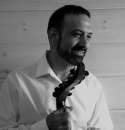
|
-
Composer and musician Basel Zayed presents music with deep roots in Arabic history and Sufi culture, but shown through the lens of a classically trained artist and conductor in Europe and now the United States. The Ayn Trio is his a vehicle for the expression of that global vision - Zayed on oud, buzuq, and vocals, Layth Sidiq on violin and Naseem Al-Atrash on cello. In his interview with Tyran Grillo, Basel says, "Since moving both to a different geographic location and a different mental and spiritual state, I have entered a new cycle in life that makes me feel more grounded, supported, and free."
In his review, Tyran writes, "The musicians work together like the past, present, and future of a protagonist whose narrative journey from 'pain and loneliness to connection and joy' makes catharsis seem like an understatement." Read the full review and a full track and samples.
Basel Zayed's Ayn Trio is our first selection for 2019's Music of the Month series. Find out more and subscribe.
|
Read more reviews from
2018
2017
2016
We Interupt Our Regularly Scheduled Magazine For This Important Announcement.
RootsWorld cannot survive without the support of our readers. If you want to hear great music and read great writers, then we need each listener and reader to contribute just a little to make it happen. Please join us!
Make a One Time Contribution Today!
|
$5.00
|
$10.00
|
$20.00
|
|
$40.00
|
$70.00
|
$100.00
|
Please contribute to our survival.
About RootsWorld: RootsWorld is a world music magazine started in 1993, pretty much at the dawn of the term "world music" as well as the pre-dawn of internet publishing (I suspect this was the first music magazine of any sort published on the www). Our focus is the music of the world: Africa, Asia, Europe, Pacifica and The Americas, the roots of the global musical milieu that has come to be known as world music, be it traditional folk music, jazz, rock or some hybrid. How is that defined? I don't know and don't particularly care at this point: it's music from someplace you aren't, music with roots, music of the world and for the world. OK?
All pages at RootsWorld are © 1992-2019 RootsWorld/ Cliff Furnald / FNI Multimedia Publishing, New Haven CT
The RootsWorld name is protected by US trademark law.
All picture and sound images are the property of the artists and record labels, and are protected by copyright. No file or part of a file may be used for any purpose, commercial or non-commercial, without the express written consent of RootsWorld or the other copyright owners.
About the use of sound files and copyright protections at RootsWorld
|
